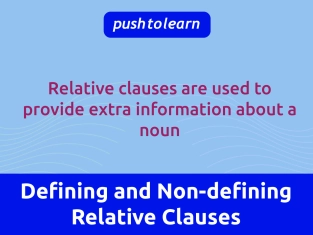by PushtoLearn
Relative Clauses
Table of Contents
Relative Pronouns Who, Which, That, Where - Exercises
These exercises focus on Relative Pronouns Who, Which, That, Where
Types of Relative Clauses
-
Defining Relative Clauses
-
These clauses give essential information about the noun. Without this information, the sentence would be incomplete or unclear.
-
Example: "The woman who is standing there is my teacher."
-
Explanation: The clause identifies which woman is being talked about.
-
Non-Defining Relative Clauses
-
These clauses provide extra information that is not essential to the sentence's meaning. They are separated by commas.
-
Example: "My brother, who lives in New York, is coming to visit."
-
Explanation: The clause gives extra, non-essential information about the brother.

Relative Pronouns and Their Uses
|
Relative Pronoun |
Use |
Example |
|
Who |
Refers to people (subject) |
"The girl who won the race is my friend." |
|
Whom |
Refers to people (object, formal) |
"The man whom I saw yesterday is kind." |
|
Whose |
Shows possession |
"The boy whose dog is barking is outside." |
|
Which |
Refers to animals or things |
"The book which I borrowed is excellent." |
|
That |
Refers to people, animals, or things (defining only) |
"The movie that I watched was great." |
Defining Relative Clauses
-
No commas
-
The information is essential to the sentence.
-
Relative pronoun cannot be omitted if it’s the subject of the clause.
Examples:
-
"The student who studies the hardest usually gets the best grades."
-
"This is the house that Jack built."
Non-Defining Relative Clauses
-
Use commas
-
The information is extra (non-essential) and can be omitted without changing the main meaning of the sentence.
-
Cannot use "that" in non-defining clauses.
Examples:
-
"My car, which is red, needs some repairs."
-
"Emily, who is an architect, designed this building."
Omitting the Relative Pronoun
In defining relative clauses, you can omit the relative pronoun if it is the object of the clause.
Examples:
-
With pronoun: "The book that I read was fascinating."
-
Without pronoun: "The book I read was fascinating."
Combining Sentences with Relative Clauses
Relative clauses can combine two sentences into one:
-
Separate sentences: "I met a woman. She is a doctor."
-
Combined: "I met a woman who is a doctor."
-
Separate sentences: "This is the school. I studied there."
-
Combined: "This is the school where I studied."
You may need to refresh your knowledge of the rules of There is / There are and know the difference between Wich vs Which to get a better understanding of using relative clauses correctly (A2 Pre-Intermediate).
Summary Table
|
Type |
Function |
Example |
|
Defining |
Gives essential information about a noun |
"The car that I drive is very old." |
|
Non-Defining |
Adds extra, non-essential information |
"My sister, who lives abroad, is visiting." |
|
Omission |
Drops the pronoun if it’s the object |
"The book I borrowed is amazing." |
FAQ About Relative Clauses
Can I use "that" instead of "which"?
Yes, but only in defining relative clauses. Example: "The car that I drive is old." However, in non-defining clauses, you must use "which."
What’s the difference between "who" and "whom"?
"Who" is used as the subject of the clause, while "whom" is used as the object.
Example: "The man who is calling wants to talk to you."
"The man whom I met was very polite."
Can relative pronouns be omitted?
Yes, if the relative pronoun is the object of a defining clause, it can be omitted. Example: "The book I read was fascinating."
Are relative clauses used in formal writing?
Yes, both defining and non-defining relative clauses are common in formal and academic writing.
What’s the difference between "whose" and "of which"?
"Whose" is used for people and things to show possession, while "of which" is mainly used for things in formal contexts.
Example: "The house whose roof is red belongs to my uncle."
"The car, the engine of which is damaged, needs repairs."

